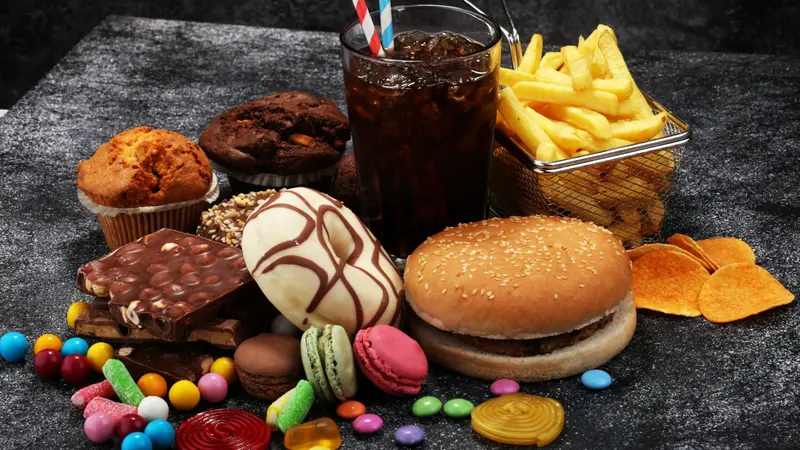
Conscious Eating
Conscious Eating
Junk Food's Impact on Sleep
In a new study, researchers at Uppsala University have investigated how junk food affects sleep. Healthy participants consumed an unhealthier as well as a healthier diet in a randomized order. After the unhealthier diet, the quality of the participants' deep sleep deteriorated, compared with those who had followed the healthier diet. The results have been published in the journal Obesity.
Several epidemiological studies have shown that what we eat is associated with changes in our sleep. However, few studies have investigated how diet itself directly affects sleep. One way to do that is to have the same participant consume different diets in a randomized order.
Previous epidemiological studies have shown that diets with greater sugar content, for example, are linked to poorer sleep. Yet sleep is an interplay of different physiological states, as Jonathan Cedernaes, Physician and Associate Professor in Medical Cell Biology at Uppsala University explains: “For example, deep sleep can be affected by what we eat. But no study had previously investigated what happens if we consume an unhealthy diet and then compared it to quality of sleep after that same person follows a healthy diet. What is exciting in this context is that sleep is very dynamic. Our sleep consists of different stages with different functions, such as deep sleep which regulates hormonal release, for example. Furthermore, each sleep stage is hallmarked by different types of electrical activity in the brain. This regulates aspects such as how restorative sleep is, and differs across different brain regions. But the depth or integrity of the sleep stages can also be negatively affected by factors such as insomnia and aging. Previously, it has not been investigated whether similar changes in our sleep stages can occur after exposure to different diets.”
Each study session involved several days of monitoring in a sleep laboratory. A total of 15 healthy normal-weight young men participated in two sessions. Participants were first screened for aspects such as their sleep habits, which had to be normal and within the recommended range (an average of seven to nine hours of sleep per night).
In random order, the participants were given both a healthier diet and an unhealthier diet. The two diets contained the same number of calories, adjusted to each individual's daily requirements. Among other things, the unhealthier diet contained a higher content of sugar and saturated fat and more processed food items. The meals of each diet had to be consumed at individually adjusted times, which were matched across the two dietary conditions. Each diet was consumed for a week, while the participants’ sleep, activity and meal schedules were monitored at an individual level.
After each diet, the participants were examined in a sleep laboratory. There, they were first allowed to sleep a normal night, while their brain activity was measured to monitor their sleep. The participants were then kept awake in the sleep laboratory, before being allowed to catch up on sleep. Their sleep was recorded in this case, too.
“What we saw was that the participants slept for the same amount of time when they consumed the two diets. This was the case both while they were following the diets, as well as after they had switched to another, identical diet. In addition, across the two diets, the participants spent the same amount of time in the different sleep stages. But we were particularly interested in investigating the properties of their deep sleep. Specifically, we looked at slow-wave activity, a measure that can reflect how restorative deep sleep is. Intriguingly, we saw that deep sleep exhibited less slow-wave activity when the participants had eaten junk food, compared with consumption of healthier food. This effect also lasted into a second night, once we had switched the participants to an identical diet. Essentially, the unhealthy diet resulted in shallower deep sleep. Of note, similar changes in sleep occur with aging and in conditions such as insomnia. It can be hypothesized, from a sleep perspective, that greater importance should potentially be attached to diet in such conditions,” explains Cedernaes.
The researchers do not currently know how long-lasting the sleep effects of the unhealthier diet may be. The study did not investigate whether the shallower deep sleep may alter functions that are regulated by deep sleep. Further research is needed in these areas as well as to determine which substances in the unhealthier diet worsened the depth of deep sleep.
REFERENCES
Brandão, L., et al. (2023, May 28). Exposure to an unhealthy diet impacts sleep microstructure during normal sleep and recovery sleep: a randomized trial. Obesity. https://onlinelibrary.wiley.com/doi/10.1002/oby.23787
Uppsala University. (2023, May 30). Junk food may impair our deep sleep. ScienceDaily. www.sciencedaily.com/releases/2023/05/230530125400.htm


 By
By







